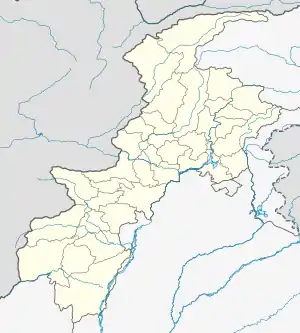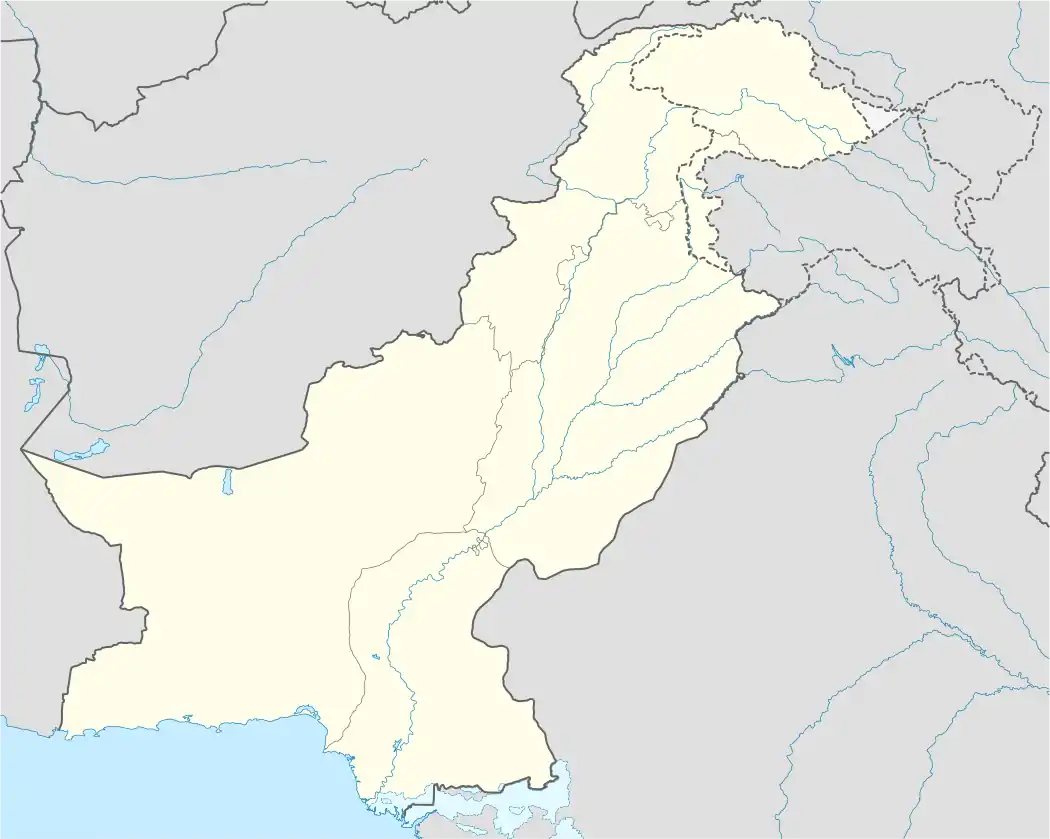Dir
دیر | |
|---|---|
City | |
 Dir  Dir | |
| Coordinates: 35°12′24″N 71°52′36″E / 35.20667°N 71.87667°E | |
| Country | |
| Province | Khyber Pakhtunkhwa |
| District | Upper Dir District |
| Elevation | 1,420 m (4,660 ft) |
| Time zone | UTC+5 (PKT) |
Dir (Urdu, Pashto: دیر) is a city in the Upper Dir Districtof the Khyber-Pakhtunkhwa province of Pakistan. It has an elevation of 1420 m. It is sometimes known as Dir Khas (Proper Dir) to distinguish it from the district's name, Dir (Upper and Lower). It lies along the Dir River, a tributary of the Panjkora River. It is at the base of the Lowarai Pass, the main road to Chitral.
Dir was founded in the 17th century. It was the capital of the former princely state of Dir, until its abolition in 1969. The former royal palace is on a hill above the city. Dir was then the capital of the Dir District. When the Dir District was divided in 1996 into Upper and Lower Dir, Dir city and Timergara became its district headquarters respectively.
Language and Tribes
Pashtuns make up the majority of the city and Pashto is the main language spoken in the city.
Climate
Like most of the southern slopes of Khyber Pakhtunkhwa, Dir has a humid subtropical climate (Köppen Cfa). Owing to the city's exposed location, rainfall from frontal cyclones from the west is heavier than in any other part of Pakistan, and their passage, as well as very penetrative monsoonal periods, are usually accompanied by heavy thunderstorms.
| Climate data for Dir, Khyber Pakhtunkhwa | |||||||||||||
|---|---|---|---|---|---|---|---|---|---|---|---|---|---|
| Month | Jan | Feb | Mar | Apr | May | Jun | Jul | Aug | Sep | Oct | Nov | Dec | Year |
| Record high °C (°F) | 22.2 (72.0) |
23.9 (75.0) |
30.6 (87.1) |
33.9 (93.0) |
38.1 (100.6) |
41.5 (106.7) |
38.1 (100.6) |
37.4 (99.3) |
35.0 (95.0) |
33.9 (93.0) |
28.0 (82.4) |
23.0 (73.4) |
41.5 (106.7) |
| Mean daily maximum °C (°F) | 11.3 (52.3) |
12.0 (53.6) |
16.1 (61.0) |
22.5 (72.5) |
27.9 (82.2) |
32.4 (90.3) |
31.2 (88.2) |
30.1 (86.2) |
28.9 (84.0) |
25.3 (77.5) |
20.1 (68.2) |
13.9 (57.0) |
22.6 (72.7) |
| Daily mean °C (°F) | 4.4 (39.9) |
5.3 (41.5) |
9.5 (49.1) |
15.0 (59.0) |
19.8 (67.6) |
23.9 (75.0) |
25.1 (77.2) |
24.2 (75.6) |
21.2 (70.2) |
16.3 (61.3) |
11.2 (52.2) |
6.4 (43.5) |
15.1 (59.2) |
| Mean daily minimum °C (°F) | −2.5 (27.5) |
−1.5 (29.3) |
3.0 (37.4) |
7.6 (45.7) |
11.6 (52.9) |
15.5 (59.9) |
19.1 (66.4) |
18.3 (64.9) |
13.5 (56.3) |
7.3 (45.1) |
2.4 (36.3) |
−1.2 (29.8) |
7.8 (46.0) |
| Record low °C (°F) | −10.6 (12.9) |
−13.9 (7.0) |
−4.4 (24.1) |
−1.1 (30.0) |
2.9 (37.2) |
8.3 (46.9) |
10.0 (50.0) |
7.9 (46.2) |
3.3 (37.9) |
0.1 (32.2) |
−7.2 (19.0) |
−9.4 (15.1) |
−13.9 (7.0) |
| Average precipitation mm (inches) | 120.6 (4.75) |
176.7 (6.96) |
253.7 (9.99) |
166.3 (6.55) |
86.1 (3.39) |
54.4 (2.14) |
160.0 (6.30) |
168.6 (6.64) |
83.7 (3.30) |
50.3 (1.98) |
58.1 (2.29) |
90.3 (3.56) |
1,468.8 (57.85) |
| Mean monthly sunshine hours | 131.6 | 129.7 | 145.8 | 195.4 | 254.2 | 282.4 | 247.1 | 223.8 | 224.1 | 221.7 | 202.5 | 140.0 | 2,398.3 |
| Source: NOAA (1971-1990)[1] | |||||||||||||
See also
References
- ↑ "Dir Climate Normals 1971-1990". National Oceanic and Atmospheric Administration. Retrieved January 16, 2013.